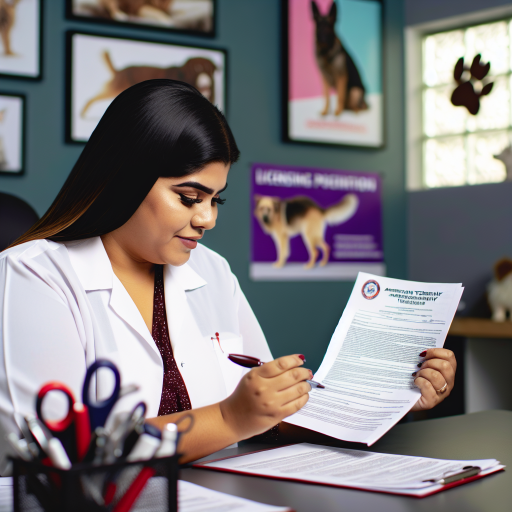Introduction:
Agricultural Quality Control Inspectors play a crucial role in ensuring the safety and quality of food products for consumers.
Regulations are essential in maintaining high standards and preventing potential health risks.
This blog post aims to outline key regulations that Agricultural Quality Control Inspectors must adhere to in their daily work.
Importance of Regulations:
Regulations are designed to safeguard public health by setting standards for food production and distribution.
Compliance with these regulations is vital to prevent contamination and ensure that consumers are protected from harmful substances.
Key Regulations for Agricultural Quality Control Inspectors:
- Conduct thorough inspections of crops, livestock, and food processing facilities to ensure compliance with hygiene standards.
- Monitor the use of pesticides, fertilizers, and other chemicals to prevent contamination of food products.
- Verify the accuracy of labeling and packaging to prevent misleading information and ensure traceability.
- Enforce proper storage and transportation practices to maintain the quality and freshness of agricultural products.
- Respond promptly to any reports of foodborne illnesses or safety concerns to prevent further outbreaks.
Maintaining Food Safety Standards:
By upholding these regulations, inspectors help to maintain the integrity of the food supply chain.
They also protect the health of consumers.
Qualifications and Training Requirements:
To become an Agricultural Quality Control Inspector, one must possess a minimum of a bachelor’s degree in agricultural science, biology, chemistry, or a related field.
Relevant work experience in the agricultural industry is essential, with most employers preferring candidates with at least 2-3 years of practical experience.
Obtaining certifications such as the Certified Crop Advisor (CCA) or Certified Professional Agronomist (CPAg) can significantly enhance job prospects and credibility.
Some states may require Agricultural Quality Control Inspectors to hold specific licenses or permits to operate within their jurisdiction.
Continuous learning is crucial in this field, with ongoing training and professional development opportunities available through various agricultural organizations and institutions.
Attending workshops, conferences, and seminars can help inspectors stay abreast of the latest trends, technologies, and regulations in the agricultural sector.
Participating in online courses or pursuing advanced degrees can also enhance an inspector’s knowledge and expertise in quality control practices.
Developing strong analytical, problem-solving, and communication skills is essential for inspectors to effectively assess and report on agricultural product quality.
Familiarity with agricultural laws, regulations, and industry standards is critical to ensure inspections are conducted accurately and in compliance with legal requirements.
Adhering to ethical standards and maintaining a high level of integrity is paramount for Agricultural Quality Control Inspectors to preserve public trust and confidence in their work.
Engaging in fieldwork, laboratory analysis, and data interpretation are common tasks for inspectors, requiring a blend of technical expertise and practical skills.
Collaborating with farmers, producers, government agencies, and other stakeholders is essential for inspectors to gather information, address concerns, and make informed decisions.
Keeping abreast of new technologies, tools, and software applications that can streamline inspection processes and enhance efficiency is crucial for inspectors to perform their duties effectively.
Transform Your Career Today
Unlock a personalized career strategy that drives real results. Get tailored advice and a roadmap designed just for you.
Start NowEmphasizing the importance of accuracy, attention to detail, and thoroughness in conducting inspections ensures that agricultural products meet quality standards and consumer expectations.
Engaging in regulatory compliance, quality assurance, and risk management practices can help inspectors identify potential issues, mitigate risks, and improve overall quality control measures.
Seeking feedback from supervisors, peers, and industry experts can provide valuable insights for inspectors to strengthen their skills, address weaknesses, and enhance their performance on the job.
Understanding Government Regulations
Federal, state, and local regulations play a crucial role in agricultural quality control inspections.
Staying updated with changes in regulations is essential for agricultural quality control inspectors.
Collaborating with regulatory agencies is necessary to ensure compliance with all relevant regulations.
Federal regulations are set by government bodies such as the U.S. Department of Agriculture (USDA).
State regulations vary across different states and may have specific requirements for agricultural products.
Local regulations are enacted by city or county governments and can impact agricultural quality control measures.
It is important for inspectors to have a comprehensive understanding of all levels of regulations.
Importance of Federal Regulations
Federal regulations set the standards for agricultural products sold across the country.
Inspectors must ensure that agricultural products meet federal requirements to ensure consumer safety.
Federal regulations often focus on food safety, labeling, and production practices in the agricultural industry.
Agricultural quality control inspectors must stay informed about changes in federal regulations to maintain compliance.
State Regulations and Compliance
State regulations may supplement federal regulations and add additional requirements for agricultural products.
Inspectors must be aware of state-specific regulations to ensure compliance during quality control inspections.
Some states require special certifications or licenses for individuals conducting agricultural quality control inspections.
Agricultural quality control inspectors must stay current with changes in state regulations to avoid violations.
Local Regulations and Impact
Local regulations can vary significantly depending on the community or county where agricultural products are produced or sold.
Inspectors must familiarize themselves with local regulations to ensure compliance with all applicable laws.
Transform Your Career Today
Unlock a personalized career strategy that drives real results. Get tailored advice and a roadmap designed just for you.
Start NowLocal regulations may address zoning laws, environmental concerns, or other specific issues related to agricultural quality control.
Failure to comply with local regulations can result in fines, penalties, or even closure of agricultural operations.
Collaborating with Regulatory Agencies
Agricultural quality control inspectors should maintain open communication with regulatory agencies at all levels of government.
Regular meetings and interactions with regulatory agencies can help ensure compliance with all regulations.
Inspectors can seek guidance or clarification from regulatory agencies when unsure about specific regulations or requirements.
Collaborating with regulatory agencies can also help inspectors stay informed about upcoming changes in regulations.
Regulatory Understanding for Quality Control Inspectors
Understanding federal, state, and local regulations is crucial for agricultural quality control inspectors.
Staying informed and compliant with all regulations is essential to ensure the safety and quality of agricultural products.
Collaborating with regulatory agencies can help inspectors navigate the complexities of regulatory compliance effectively.
By following regulations and guidelines, agricultural quality control inspectors can contribute to a safer and more efficient agricultural industry.
Remember, regulations are put in place to protect consumers and ensure the integrity of agricultural products.
By adhering to these regulations, inspectors play a vital role in maintaining the quality standards of the agricultural industry.
Learn More: The Role of Agricultural Economists in Crop Forecasting
When it comes to inspection procedures and protocols for agricultural quality control inspectors, it is crucial to follow a systematic approach to ensure the accuracy and reliability of the inspection process.
Detailed Explanation of the Inspection Process
- Inspectors should begin by reviewing relevant documentation such as previous inspection reports, production records, and quality control procedures.
- Conduct a thorough visual inspection of the agricultural facility, equipment, and production processes to identify any potential areas of concern.
- Take note of any deviations from industry standards or regulatory requirements that could impact the quality of agricultural products.
- Collect samples of agricultural products for testing and analysis to verify compliance with quality control standards.
- Document all findings, observations, and test results accurately to provide a comprehensive report on the inspection process.
Documentation Requirements for Inspections
- Inspection reports should include details of the inspection date, time, location, and the names of all individuals present during the inspection.
- Ensure that all relevant quality control documents, such as SOPs, batch records, and test results, are reviewed and referenced in the inspection report.
- Include photographs or visual records of any non-compliance issues or areas of concern to support the findings documented in the report.
- Provide recommendations for corrective actions to address any deficiencies identified during the inspection process.
- Obtain signatures from both the inspector and the responsible parties at the agricultural facility to acknowledge receipt of the inspection report.
Proper Handling of Samples and Testing Procedures
- Inspectors should follow strict protocols for the collection, labeling, and transportation of samples to ensure the integrity and traceability of the testing process.
- Adhere to established testing procedures and protocols to obtain accurate and reliable results for all samples collected during the inspection.
- Use calibrated equipment and maintain proper documentation of all testing procedures, reagents, and controls used during sample analysis.
- Record detailed observations of sample characteristics, testing methods, and results to support the findings presented in the inspection report.
- Ensure that all samples are handled, stored, and disposed of in accordance with established guidelines to prevent contamination or cross-contamination.
By following these inspection procedures and protocols diligently, agricultural quality control inspectors can uphold the highest standards of quality and safety in the production of agricultural products.
Gain More Insights: Food Science and the Global Food Supply Chain
Identifying Quality Control Issues:
In the field of agricultural quality control inspection, there are several common issues that inspectors frequently encounter during their inspections.
It is essential for inspectors to be well-versed in identifying these issues to ensure the quality and safety of agricultural products.
Common issues found during inspections:
- Presence of pests and diseases in crops
- Chemical residues on agricultural products
- Inconsistencies in labeling and packaging
- Improper storage and handling of products
- Contamination from foreign matter or pathogens
Techniques for identifying potential quality control problems:
- Visual inspection of products for abnormalities
- Sampling and testing for chemical residues
- Checking temperature and humidity levels in storage facilities
- Reviewing documentation for compliance with regulations
- Conducting interviews with farmers and suppliers
Reporting and documentation protocols for issues found:
When inspectors identify quality control issues during their inspections, it is crucial that they follow specific reporting and documentation protocols to ensure that proper actions are taken to address these issues.
- Complete detailed inspection reports outlining the issues found
- Include photographic evidence to support findings
- Cross-reference findings with relevant regulations and standards
- Submit reports to relevant regulatory bodies for further action
- Communicate findings to relevant stakeholders for corrective measures
By being proactive in identifying and reporting quality control issues, agricultural quality control inspectors play a crucial role in safeguarding the integrity and safety of agricultural products for consumers.
Transform Your Career Today
Unlock a personalized career strategy that drives real results. Get tailored advice and a roadmap designed just for you.
Start NowYou Might Also Like: How Agricultural Policies Shape Rural Economies
Enforcement of Regulations:
- Steps taken when violations are found
- Consequences for non-compliance with regulations
- Working with farmers and producers to address violations and improve compliance
When violations are found during agricultural quality control inspections, inspectors must take immediate action to address the issue and ensure compliance with regulations.
Steps taken when violations are found:
Inspectors should document the violation, issue a warning or notice to the farmer or producer, and provide clear instructions on how to rectify the issue.
Follow-up inspections may be scheduled to verify corrective actions have been taken and compliance has been achieved. In cases of serious violations, enforcement actions may be necessary.
Consequences for non-compliance with regulations:
Failure to comply with agricultural quality control regulations can result in penalties, fines, and even suspension or revocation of licenses or certifications.
These consequences are meant to deter non-compliance and encourage adherence to established standards to safeguard the quality and safety of agricultural products.
Working with farmers and producers to address violations and improve compliance:
Inspectors play a critical role in educating farmers and producers about regulations, providing guidance on best practices, and offering support to ensure compliance.
By working collaboratively with the agricultural community, inspectors can help address violations, improve overall compliance, and enhance the quality of agricultural products.
Enforcement of regulations is essential for maintaining high standards of agricultural quality control. Inspectors must take swift and appropriate action when violations are found, impose consequences for non-compliance, and work closely with farmers and producers to address violations and improve compliance. This collaborative approach is key to ensuring the quality and safety of agricultural products for consumers.
Find Out More: Impact of Pesticides on Environment and Solutions

Communication Skills:
Effective communication is crucial for agricultural quality control inspectors to interact with farmers, producers, and colleagues.
Clear and concise communication ensures that everyone involved in the inspection process understands their roles and responsibilities.
Inspectors must be able to convey inspection results and recommendations accurately to farmers and producers.
This includes explaining any issues discovered during the inspection and suggesting ways to address them.
Using simple language and visuals can help make the information more accessible and understandable.
When conflicts arise during inspections, inspectors must address them professionally and promptly.
This may involve calming tense situations, listening to all parties involved, and finding solutions that satisfy everyone.
Resolving conflicts in a fair and respectful manner helps maintain positive relationships with farmers and producers.
Communication skills also play a vital role in collaborating with colleagues.
Inspectors need to exchange information and coordinate tasks effectively to ensure the inspection process runs smoothly.
Transform Your Career Today
Unlock a personalized career strategy that drives real results. Get tailored advice and a roadmap designed just for you.
Start NowSharing updates, progress reports, and insights with colleagues fosters teamwork and enhances the overall quality of inspections.
Building strong communication skills as an agricultural quality control inspector takes practice and dedication.
By actively listening, choosing the right words, and adapting communication styles to different audiences, inspectors can build rapport with farmers, producers, and colleagues.
Good communication enhances trust, credibility, and efficiency in the agricultural inspection process.
- Importance of effective communication with farmers, producers, and colleagues.
- Techniques for delivering inspection results and recommendations.
- Resolving conflicts and addressing concerns in a professional manner.
Technology and Tools:
Utilize digital record-keeping and testing equipment for inspections.
Provide training on new tools and techniques for inspectors.
Implement technology to enhance efficiency and accuracy in inspections.
In today’s world, technology plays a crucial role in every aspect of our lives.
This includes agricultural quality control inspections.
Agricultural quality control inspectors must stay updated with the latest tools and technologies.
This ensures they can effectively perform their duties.
This section will delve into the importance of technology and tools in agricultural quality control inspections.
Digital record-keeping and testing equipment have revolutionized the way inspections are conducted.
By using digital tools, inspectors can quickly and accurately record data.
This makes it easier to track and analyze information.
This not only saves time but also reduces the margin for error in inspections.
To ensure that inspectors are proficient in using these new technologies, regular training sessions should be organized.
These training sessions should cover the functionality of the tools.
They should also encompass best practices for using them during inspections.
By equipping inspectors with the necessary skills, they can carry out inspections more effectively.
Transform Your Career Today
Unlock a personalized career strategy that drives real results. Get tailored advice and a roadmap designed just for you.
Start NowIncorporating technology into inspections can significantly improve efficiency and accuracy.
For example, drones can be used to conduct aerial inspections of agricultural fields.
This provides a comprehensive view of the crops.
It helps inspectors identify any issues quickly.
They can then take necessary actions to rectify them.
Moreover, utilizing software applications can streamline the inspection process.
This can be done by automating certain tasks.
For instance, mobile applications can be used to capture data in real-time.
This eliminates the need for manual data entry.
It ensures that inspections are carried out more efficiently and accurately.
The use of technology and tools in agricultural quality control inspections is essential for modernizing the inspection process.
By embracing new technologies, inspectors can work more efficiently.
They can ensure accuracy in their findings.
Ultimately, they contribute to maintaining high agricultural quality standards.
Ensuring Agricultural Safety and Quality
As Agricultural Quality Control Inspectors, it is crucial to adhere to key regulations to ensure the safety and quality of agricultural products.
Following these regulations not only protects consumer health but also maintains the reputation of the agricultural industry as a whole.
Inspectors must stay informed about the latest regulations and best practices in quality control.
By continually improving their skills and effectiveness in their role, inspectors play a vital role in safeguarding the food supply chain.
Being diligent in their inspections also helps maintain consumer trust.
Additional Resources
Nonpoint Source: Agriculture | US EPA
Transform Your Career Today
Unlock a personalized career strategy that drives real results. Get tailored advice and a roadmap designed just for you.
Start NowProtecting Agriculture | U.S. Customs and Border Protection
[E-Books for Sale]
The Big Book of 500 High-Paying Jobs in America: Unlock Your Earning Potential
$19.99 • 500 High-Paying Jobs • 330 pages
Explore 500 high-paying jobs in America and learn how to boost your career, earn more, and achieve success!
See All 500 High-Paying Jobs of this E-Book
1001 Professions Without a Degree: High-Paying American Jobs You Can Start Now
$19.99 • 1001 Professions Without a Degree • 174 pages
Discover 1001 high-paying jobs without a degree! Unlock career tips, skills, and success strategies for just $19.99!




